September 9th, 2010 · 6 Comments
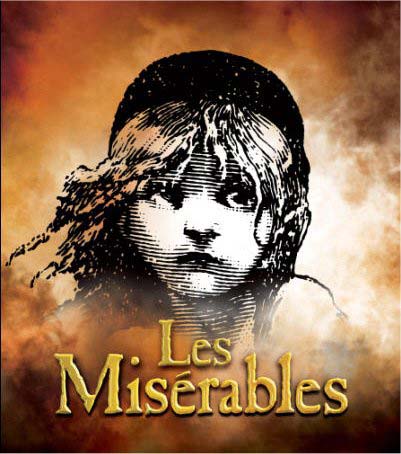
Picture obtained from: http://www.musicaltheatrenews.com/les-miserables.html
Given our readings like Watching the English and our everyday observations of English, the subject of accents has come up a lot on our trip. Many ‘English’ seem to be very conscientious of one’s accent, and can determine one’s native origin and class based on a few sentences. While I have come to expect different situations surrounding speech during my time here in London, one place I did not expect to encounter the topic was at last night’s performance of Les Miserables.
After all, the show takes place in France about 150 years ago. If any accents are going to pop up in the show, you would expect them to be French. This was definitely not the case. All of the characters primarily associated with the lower classes, and usually the ones used for comedic effect (For those familiar with the show, The Thenardiers and Gavroche primarily) had Cockney accents. It struck me as particularly odd. The show as it was performed was, apparently, responding to the English social cue that Cockney accents are associated with a lower class. Therefore, even though it makes no sense for French characters to have Cockney accents, it made sense to the director for these actors to employ them anyway.
I find this very distinct from my experience in the United States. If a show/film is set in a different country than the U.S., all of the actors will either use an accent, all speak in one distinct type of American accent, or use their own accent. While the U.S. certainly attributes certain stereotypes to certain accents, I cannot imagine any show or film using one regional accent to denote someone of a lower class. I think this may be because the Americans simply do not associate speech with class as strongly as the English do. The only case, that I can think of, where the characters from a lower class employ different accents is, interestingly enough, the U.S. version of Les Mis. Even more interesting, in that version (at least on the CD and I’m pretty sure the performance I saw), Cockney accents are employed as well. I never even thought about it until last night, but that leads to a whole slew of questions concerning why the U.S. would employ an English dialect in a show about France. Certainly, the U.S. show was imported from the West End, but it still seems odd they would continue to use Cockney accents.
I am curious to see what others think about this: Is this fixation on accents distinctly English? Why does the U.S. version use Cockney accents as well? I find it very interesting that speech and class find their way, inadvertently, into the arts in London.
If you want more information about the show, you can visit the website: http://www.lesmis.com/
Tags: 2010 Andrew
September 7th, 2010 · 1 Comment
… So far.
During the two weeks in London, I have so far had the opportunity to see a variety of shows, which have offered different perspectives of theatre culture in England.
First, there was The Merry Wives of Windsor at The Globe. As a groundling after a long day exploring the city, my feet were exhausted by my excitement levels were through the sky (well, higher than usual, as they tend to be at somewhat extreme heights in general). Seeing Shakespeare performed at The Globe was an incredible experience for many reasons. Not only was the performance one of the best live productions that I have seen, the theatre’s atmosphere was almost indescribable. It was almost if everyone had traveled to the turn of the 17th century. Usually, everyone is quiet during the performance and politely respectful of the performers. While this was the case, the audience seemed more willing to shout, cheer, and laugh uncontrollably at the events on stage. Being so close to the stage, the magic of the actors radiated from the stage and created an atmosphere unmatched by any performance thus far. The added music also added to the atmosphere- an Early Modern theatrical experience would have had the pre-show performers and would have been completely different from what we are used to. The performance was as close to replicating that experience as possible in our modern world. Afterwards, we were able to thank some of the actors and they seemed sincerely grateful that we said something- an idea that would be challenged later.

Next came the Proms at Royal Albert Hall. While The Globe was magical, Proms was one of the most equalizing of the performances because of how accessible they were. In the States, every classical concert I have been to has been a stuffy affair. There, the celebration of the music was open and everyone seemed to be unified in their desire for good music (which the audience should not have been disappointed with). The biggest issue I had with the Proms was the incessant coughing. Usually people try to hold their coughs, but when one or two people cough at during movements, it doesn’t provide an excuse for everyone to cough uncontrollably to prove they can and that they are not going to do disrespect the musicians by coughing during the performance. I would like to go back to Proms to see if it is a bizarre tradition or if that night was a fluke.
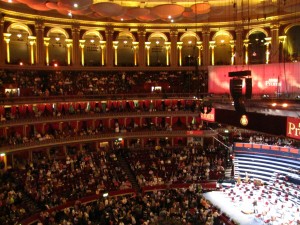
Royal Albert Hall
My following experience was Billy Elliot, which I have already blogged about, so I’ll try not to be redundant here. Other than being my first big West End experience, it was also important because it showed a lot of the themes of our course in a new light. Instead of applying the themes to the immigrant communities, it showed the themes in terms of a distinctively native English story. Furthermore, it also highlighted two differences between English and American theatre in particular. Firstly, we aren’t used to paying for our programs in the States. As an avid theatre goer, I’m used to being handed a Playbill (or regional equivalent) and continuing into the theatre. I don’t have to wonder who the cute guy playing a certain character is or why so and so looks so familiar. I don’t mind paying an extra three quid when I’m paying half of what I’m used to paying, but it definitely caught me off guard. Secondly, the tradition of stage door here is (as far as I’ve gathered) practically non-existent. In NYC, it is fairly common to wait after the show at the stage door to thank the actors for their performance, get an autograph, and if you are lucky, a photograph. (Yes, this can be a weird experience, but it can also be a great one.) When we went after Billy, it was completely different. While there were people there, the actors went by ignoring everyone. After Holly mentioned it, I realized that this was indeed a representation of the English concern for privacy and social dis-ease. On stage, the actors are free from interacting with the strangers feet away from them. At the door, they are in a different type of spotlight. Yet, the boundaries between personal and private life would not intersect. They are still technically at work. The guys from The Globe seemed to enjoy that we acknowledged them. I can’t wait to try another stage door experience to see the difference. (I planned to try again after Les Mis, but it was raining…)

The Victoria Palace, Home of Billy Elliot
Next came Bedlam, back at The Globe. For the first play by a woman performed there, the show was interesting. I’d like to say it succeeded it my expectations (which weren’t that high), but it didn’t. It did meet them, but something about the show was lacking the magic of the first show we saw there. At the end of the first act, I wasn’t at all satisfied, but by the end of the second, it had redeemed itself. I’d like to blame this all on not being a groundling and therefore surrounded by the audience members and the actors. I did enjoy it but it was not my favorite by any stretch.

The Globe, A View From Above
Lastly (thus far) is Les Miserables. One of my favorite musicals, I thoroughly enjoyed it. Despite the fact Marius has a slight bald patch, the actors were outstanding. (Even Norm Lewis, who I have seen in another musical and was THOROUGHLY disappointed in then, was outstanding. His awkward- but commanding- stage presence was perfect for Javert.) A truly equalizing musical, I was not surprised to see people in blue jeans and others in formal dresses. The difference is interesting when considered in the context of the musical and its equalizing themes. Theatre in London is truly for everyone- no matter one’s status. Seeing the opposites in dress at this show hit me as strangely appropriate. (I don’t want to elaborate knowing that some of you guys have yet to see it. So, I’ll just leave it at that.)
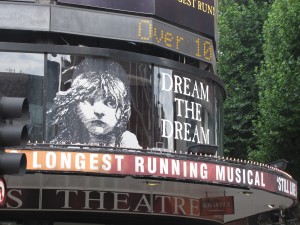
So far, I’ve thoroughly enjoyed my experiences at the theatre and can’t wait for more. I’m hoping to see Wicked (my favorite, in case you have missed that slight detail) and Blood Brothers at the very least. While technically not theatrical, I also expect my experiences at the various football matches I’m planning on going to to be worthy of a theatre stage!

Tags: 2010 Stephenie · Theatre
The Notting Hill Carnival was not what I expected, but at the same time did meet some of my expectations. The ones it met: the drinking/party atmosphere (it also exceeded this one by a lot) and excellent food. The parade disappointed me; I was expecting more cultural representation and differentiation. Instead, I found it to be lacking. My initial reaction was, “Okay. This is different, but cool.” By the third “float,” however, I found them to redundant. The costumes were gorgeous, but some of the marchers should have rethought their costume decisions. Coming from a family that loves parades- we watch every Thanksgiving Day & Rose Bowl parade together- I was expecting different floats, all intricately designed and reflective of the culture of the community who put that float together. Instead, it was mostly people in sequined and glittery costumes walking behind a big truck (or double decker bus) that was playing loud music- some of which was American. I was hoping for a cultural learning experience, not a chaotic drinking party in the middle of the day posing as a cultural experience. Setting aside the drunkard-dodging and remixed American music, I enjoyed the carnival for the experience it offered; it was definitely a chance to observe the English in what Fox referred to as a “liminal” space. In different ways, I felt that people were more relaxed and open to just enjoying the experience. The typical English reserve seemed to be greatly diminished (among the sober and definitely not sober). It was a great overall experience, but I don’t think I would go to the Carnival in the future.
-
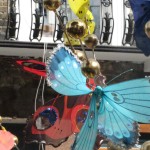
-
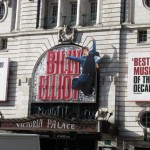
Billy Elliot, however, exceeded all of my expectations. It is something I wanted to see while I was here, but I never expected it to tie Wicked for my favourite musical. (Note: I’m a bit obsessed with Wicked. You probably don’t want to mention it in a 10 foot radius of me if you don’t want to get into a lengthy discussion.) About a young boy who discovers that he is a talented dancer and decides he wants to dance for life, the story concentrates on several of the topics we have (or will) discuss will discuss in class, including labor strikes, class, and the government. Throughout the entire musical, class is an issue. For the miners in Billy’s community, dancing isn’t something done. A male dancer is a “poof” not to be taken seriously. A career as a miner and providing a steady income for one’s family is the most respectable option. Billy’s dad is dead set against Billy dancing, but when he realizes he is so talented and can’t help but dance, he decides to go back to work in the mines. (They’ve been in the middle of a mining strike.) Breaking the strike drives a wedge between him and his older son, Tony. The representation of community in the musical, especially among the miners despite their hardship, is an excellent example of the way our readings have mentioned communities coming together. Furthermore, seeing this community on throughout their strike adds a human dimension that our readings could not express. It brought the stats to life for me, which is something that I normally look to art to do. The musical also touches on Thatcher’s government & the way that it reacted to the strike to break it. (“Merry Christmas Maggie Thatcher” had to be one of the most hilarious and poignant scenes in the entire musical, giving an excellent representation of how elitist that government seemed.) I could go on forever on the way that it relates to class. It’s an excellent musical that I think everyone should see. There is something for everyone in it, especially as we all consider the diversity of London, the struggles of labor, and the English class system.
Tags: 2010 Stephenie
September 14th, 2009 · 1 Comment
In hindsight, loading our month in London with plays was a very good idea. I wasn’t so sure when we began that it would be. Especially given the diversity of the theatre experiences we had: The Globe, a heady comedy-drama in the West End, Shakespeare at The Olivier Theatre, Back to the NT for a contemporary English class drama, then finishing up with a musical that’s been running forever in the West End. That hardly sums up the entirety of London theatre, but these experiences gave us a small sense of the myriad theatre traditions and experiences the city has to offer. Maybe as importantly, they served as a break from tours, walks and other activities which involved actively learning about the history and economics of London and instead allowed us to enjoy one of London’s truly greatest products firsthand.
“Hector is Dead!”
I was perhaps most surprised by enjoying Troilus and Cressida at the Globe. I was not heartened when, in the minutes before the show started, the guy behind me showed up with Starbucks cup in hand (A.N. Wilson had specifically lamented the fact that there was a Starbucks within shouting distance of the recreated Globe). With what I knew about the original Globe and after reading Wilson’s dreadful review, I was all ready to agree that a Disney-ish Globe recreation where groundlings stand but there’s no audience interaction or adjacent bear beating just wasn’t The Globe. But a few minutes in I decided I should just stand back and enjoy it. The cast and crew should be commended for making a consistently compelling production of a difficult Shakespeare history, even if it occasionally was a bit Disney-ish. I don’t think any of us who read the play were expecting such a good experience.
“Bring a Book”
Head craning and head scratching though it may have involved, Arcadia was my favorite play and the Duke of York Theatre my favorite theatre. I thought the Duke of York was a cool space; intimate enough for an intricate and intense play like Arcadia but not too small to provide the uproarious laughter the play deserves. I actually liked where we sat, which I thought provided a better view of the whole play’s upstage and downstage action. I’m sure I didn’t even come close to understanding Arcadia, but with any difficult work of art all I ask the first time around is if I’m left intrigued enough to want to see it again, and I absolutely feel that way about Arcadia.
“My Mind is Wrapped in Dismal Thinkings”
I feel mostly positively about All’s Well That End’s Well at the Olivier, and I think that puts me in the minority. It’s certainly a frustrating play in terms of a sort of flimsy premise and (personally) unsatisfying ending (sometimes it seemed more Gilbert and Sullivan than Shakespeare), but I thought the unique set design, lighting, and music deserves credit for making the play much more endearing than I imagine it would be on the page. The Olivier must be the largest space I’ve ever seen a play in, and this particular production did suit the enormous space. I’m not sure if I’d go back to see another play there unless I was sure that particular production could accomplish this. That said, I feel very positively towards the National Theatre, both in terms of the building and its mission, both of which I addressed a few weeks back.
“No One Ever Gave Them a Paintbrush!”
I wish I’d gone back to the Globe for As You Like It, which I heard glowing reviews of from everyone, but I felt a little tired and Shakespeared out. The Pitmen Painters at the Lyttleton Theatre more than made up for it, though. Almost everyone has put in their two cents on the philosophical or political meaning of the play, and there certainly is a lot to ponder and debate there, but the main theme that stuck with me is the debate over what art is supposed to mean and what relationship the individual is supposed to have with it. Of course the play frames this as a political question, but I think it’s a fundamentally human one that works of art themselves don’t always address well. I had a few problems with the play as well, particularly the last scene (which was like being hit with a socialism-lamenting dead fish after several hours of relative subtlety). I thought it was worth seeing for 27 foreigners trying to understand England as it obviously focuses on class distinction, but also language and accents and geography. We often (given our maybe skewed perspective) don’t think of where one lives in England as having as much of an effect on identity as where one lives in America. However, I think Ashington is a good example of a place that’s so socially and economically isolated from the rest of the country, even if it’s not as geographically far away as, say, West Virginia is from New York City. All the more reason The Pitmen Painters was a good thing to see before heading off to Norwich.
“(ominous keyboard chord)”
I won’t pile on Blood Brothers at the Phoenix, and instead I’ll say that it certainly represents a mainstay of the London theatre scene. Namely the for-profit, familiar show of middling quality which thrives (but doesn’t necessarily dominate) the West End. Rick Fisher talked about this kind of show, and how it’s come to mean that some of the best, most innovative and fun stuff now is at the pub theatres and black boxes all around town. A thing to think about next year might be going to the National Theatre’s black box (presuming the play there is worth it) or venturing even further into the fringe of London theatre. However next year is scheduled, I hope the students somehow get as much quantity and quality in their theatergoing experiences as we did.
Tags: Aidan
I’m going to be perfectly honest: I’ve never been a big fan of the theater. I’m the sort of person who will go see anything and be able to appreciate it or be critical of it for seemingly valid reasons, but I’ve just never really enjoyed live theater the way I do films: the choice of only one or two settings has always felt extremely limited for my wild and vivid imagination, I’m a bit hard of hearing and can’t turn the volume up on live actors, people don’t suddenly break into coordinated song and dance routines in real life, there’s a huge margin of error for mistakes and unwelcome variation between performances, and it’s much harder to blow things up and create huge messes on a stage. I’m a fan of realism and authenticity, and sometimes I just can’t suspend my disbelief with plays the way I can with movies.
All of this being said, I’ve always been fascinated by the production aspect of live theater. I was heavily involved with the production and tech crews at my high school, and I used to enjoy nothing more than Hell Week before opening night, sitting in the black box theater in the wee hours of the morning, flicking lights on and off, organizing props, and putting finishing touches on the set. After hearing Rick Fisher speak about his experience with the theater and taking the tour of the National Theatre today, I’ve started longing to go back to stage managing and tech production. I’m attempting to see as many plays as I can during our time in London in order to try to condition myself into enjoying being an audience member, but I think I will always prefer being a part of the action rather than watching it. I kind of wonder if this is a problem: enjoying working very hard towards an end product you don’t really care for.
I’ve never been an avid play-goer before this trip, but I feel as though the West End has a bit less glitz and a bit more pride than Broadway. Perhaps pride is the wrong word, and perhaps I’ve been seeing and hearing of the wrong plays, but I often think of many Broadway plays as being a good and expensive night out, but the West End seems to treat the plays as more of an art form and something that everyone should be able to enjoy and appreciate. If the advertisements on the Tube are any judge, the West End has its fair share of mindless plays based on popular movies, but the simple fact that there are cheap seats, student discounts, overwhelming amounts of Shakespeare, government funding, and seemingly many more British film and television stars on the stage as well as the screen (working for meager amounts of money) makes me believe that in England, the theater is more of a cultural institution meant for everyone rather than deep appreciation for few, or simple entertainment.
I grew excited last night upon learning that Arcadia was written by Tom Stoppard, who also wrote Rosencrantz and Guildenstern are Dead and co-wrote Shakespeare in Love. I seemed to have forgotten, however, that his work, while usually hysterical and thought-provoking, is also very dense and requires a fine-toothed comb to find all of the hidden jokes, references, and subject matters. This, coupled with the fact that I was inexplicably exhausted and that my hearing can be likened to that of a seventy-year-old man’s made me unable to completely follow much of the play, but apparently I wasn’t alone. I think reading it would make things clearer.
I’m foregoing the next performance at the Globe simply because I don’t know if my back could handle another few hours as a groundling, but I’m attending All’s Well That Ends Well tomorrow night in its stead in a valiant effort to see more plays, learn to appreciate the finished product rather than just the behind-the-scenes work, and learn to like Shakespeare.
Tags: Chelsea · Theatre









